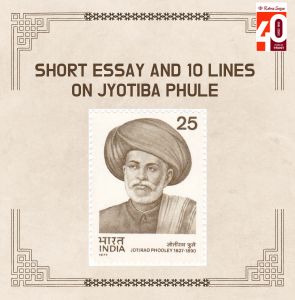Short Essay on Jyotiba Phule
Jyotiba Phule was a great social reformer and thinker of the 19th century. He was born on 11 April, 1827, in present-day Maharashtra. His full name was Jyotirao Govindrao Phule.
Phule was a visionary reformer who believed in equality and social justice for all.
He dedicated his life to the upliftment of marginalised communities, especially the oppressed castes and women. Phule advocated for equality of all and abolition of discrimination of any kind. He strongly opposed the social order of those times which did not allow women and oppressed castes to gain education.
Jyotiba Phule laid the foundation of women’s education in India. He established the first school for girls in India in 1848. Phule believed that education was the key to empowerment and liberation from oppression. He advocated for universal education, regardless of caste or gender and emphasised the importance of critical thinking and rationality.
Phule was also a prolific writer and thinker. He wrote several groundbreaking texts, including “Gulamgiri” which criticised the oppressive practices of the caste system. Through his writings and speeches, Phule inspired countless individuals to question traditional norms and fight for social justice. Phule, along with his wife Savitribai Phule, played a significant role in the advancement of women’s rights in India. Together they established schools and widow shelter homes. Phule’s vision of a more just and equitable society serves as a guiding light for those striving for social change and equality.
10 Lines on Jyotiba Phule
- Jyotiba Phule was born on 11 April 1827, in present-day Maharashtra.
- His full name was Jyotirao Govindrao Phule.
- He was a visionary social reformer of the 19th century.
- Phule was a visionary reformer who believed in equality and social justice for all.
- He dedicated his life to advocating for equality and social justice for all, particularly for marginalised communities such as oppressed castes and women.
- Phule strongly opposed discrimination in any form and worked towards abolishing oppressive social norms prevalent during his time.
- He pioneered women’s education in India by establishing the first school for girls in 1848.
- Phule’s writings, notably “Gulamgiri,” criticised the caste system and inspired others to question traditional norms and fight for social justice.
- Alongside his wife, Savitribai Phule, he played a significant role in advancing women’s rights by establishing schools and widow shelter homes.
- Jyotiba Phule’s vision of a just and equitable society continues to inspire those working towards social change and equality.
Read More…
Short Essay and 10 Lines on Baisakhi
Short Essay and 10 Lines on Eid Ul-Fitr
Short essay and 10 lines on Ugadi
Short Essay and 10 Lines on Easter
Short Essays and 10 Lines on Holi
Short Essay and 10 Lines on Navroz

